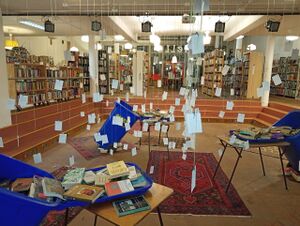Special issue 19
garden leeszaal
was a momentary snapshot of the state of a library seen through the metaphor of gardening; pruning, gleaning, growing, grafting and harvesting. garden leeszaal was an open conversation; a collective writing tool, a cooperative collage and an archive. we asked participants to think of the library as a garden. for us, being a gardener meant caring; caring for the people and books that form this space.
📕 pad collection
☞ one: tasks of the contingent librarian
𓇬 special issue
dear diary, today we took some notes on notes. i take notes on my phones notes, notion, and my own personal groupchat i have on whatsapp with myself. we talked about libraries as ideology, as a verb. we picked cards from tasks of the contingent librarian that resonated with us. then talked about them, then walked about what we talked about and transcribed what we heard.
me and irmak: a reader who downloads is a passive reader, we related to the idea of multiplying form, people annotating on things also adds to a text. Also the idea of open-sourcing, assuming that knowledge is private property. It's not going to be the same things when you share you notes with me because I'm a different person, it's not that, knowledge is fluid. Skimming/scanning: what's the difference?
𓇬 prototyping
breadcube setup, keywords: sandbox, raspberry pi, server, unix-like software, post-PRISM age (surveillance program). Sandbox:
- Spaces for testing and prototyping software and describe how users and processes can be isolated for security purposes.
- Debian = OP most often used for servers, or computer without a graphic interaction (only terminal). UTF8 = character encoding
Server commands BREADC
ssh ada @145.24.139.110
wall message
pwd (home)
ls (listing command)
apt intall nginx(install engine sever to access files from the server)
cd var/www/html
nano ada.html
(exit cntrl x)
http://145.24.139.110/ada.html
<a href="suzan.html".suzan,/a>
(to write)
figlet -f /usr/share/figlet/script.flf MESSAGE
ls /usr/share/figlet/
figlet -f shadow ada
- Root = main user
- Pseudo but not root: pseudoappinstall (will work if ur not root)
𓇬 methods
ursula le guin, read in class. crazy read, been reading her fantasy work for years but never saw this.
- she unnames them = the process of naming in the text as gifting and unnaming as giving back a "useful gift" that does not serve something/someone well anymore. the agency of naming oneself, how giving yourself a name can be empowering like the yaks named themselves and how it became so redundant.
- the author of the acacia seeds = the scientists in the text being referred to as linguists and literary experts rather than translators and interpreters, removing the human layer of meaning from animal language.
- the carrier bag theory of fiction = If it is a human thing to do to put something you want, because it's useful, edible, or beautiful, into a bag, or a basket, or a bit of rolled bark or leaf, or a net woven of your own hair, or what have you, and then take it home with you, home being another, larger kind of pouch or bag, a container for people, and then later on you take it out and eat it or share it or store it up for winter in a solider container or put it in the medicine bundle or the shrine or the museum, the holy place, the area that contains what is sacred, and then next day you probably do much the same again--if to do that is human, if that's what it takes, then I am a human being after all. Fully, freely, gladly, for the first time.
- carrier bag library: A bag where people add as much as take away, where the mastery of knowledge is less important than the sharing of information, mutual knowledge, Leeszaal (no checkout, relationship built on trust and knowledge not seen as private propriety) Within a society of surplus, book donation makes sense

